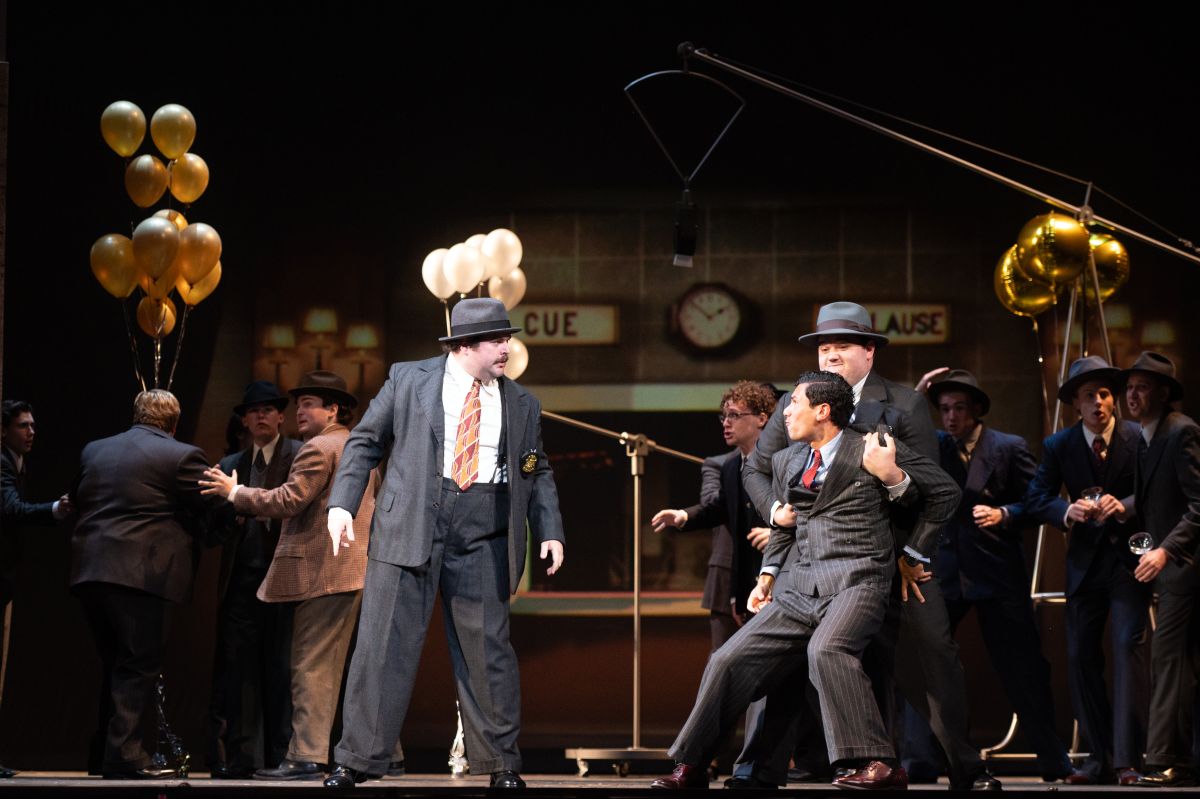Gene Scheer: Hello, I'm Gene Scheer, and I am the librettist for the Amazing Adventures of Kavalier and Clay, with music by Mason Bates, and the opera is being done here at IU in preparation for a premiere, a world premiere at the Metropolitan Opera next season.
Aaron Cain: The book, The Amazing Adventures of Kavalier and Clay, is 639 pages, which happens to be four pages more than Moby Dick, which you also adapted into an opera with music by Jake Heggie a few years back. And cavalier and clay, the book, takes place over many years over a number of continents, even Antarctica, so it seems like the kind of story that would be challenging to fit into a ten-hour television series. So how did you distill it into an opera? How did you go about it?
Gene Scheer: When I started looking at a source for an opera, the first thing I'm doing is looking for the lay-ups. I'm looking for the things that are obviously operatic, or to me that seem obviously operatic, and there are a number of them in Michael Chabon's book. The scene that takes place on the top of the Empire State Building is a really operatic scene. His siblings being lost at sea is a very dramatic scene. The romantic scenes between the two romantic couples in the story, but there's a lot. The story is so sprawling that it required me to cut a lot of the story out and just make sure I was focusing on the major threads of Michael's story. It also required me to sort of invent in one case a different character, the purpose of which was to show what is happening in the story. I'm not telling a story. I'm showing a story. And that's the difference between writing a novel and writing an opera libretto. It doesn't appear that there's a narrator in opera, but actually there is. The composer is the narrator. The real major decision that I made in crafting this libretto was to bring the three different worlds of the book to life in different ways, and having three different musical languages, hopefully—which is what has transpired as Mason has done it—three distinct musical styles. There is the Holocaust. What's happening in Europe, we bring that to life. We bring the World War 2 experience to life, musically. And then there's the imaginative creation of what they're creating, The Escapist comic book series, that is also brought to life. So we have three different worlds, three different musical styles. And then as Joe is going mad, when he discovers that his family has all been lost in the Holocaust, these three musical styles starts smashing together. So there's a musical correlate. There's a way of telling the story musically. And so when you have these three distinct musical styles smashing together, as Joe is going mad, I certainly hope that it lands for the audience and they're getting Michael's beautiful story communicated to them in a different way.
Gene Scheer: We have a character, Joe Kavalier, who is a gifted artist who, along with his cousin, create The Escapist comic book, which becomes very successful. And the idea is to raise money so he can get his family out of Europe. And then, of course, I knew because we were working with these incredible artists from 59 Productions who are just extraordinary, that they could create these brilliant drawings, these brilliant sketches that then bloom into the full comic books. And it's so much fun for the audience to watch this comic book, these comic book characters ,and this world of comics come to life. Because what happens in the story, of course, is that it starts off as a comic book sensation, then a radio sensation, and then there's the hope of making it into a movie. So in order to show how successful it is, we actually do a whole radio show of an episode of The Escapist. And as the singers are performing this radio show, as the characters are performing this radio show, we see it bloom to life visually right before our eyes. We're using all of these sort of mighty tributaries are flowing into this river of this opera to try to make it a special experience for the audience.
Gene Scheer: And of course the most important aspect of this is the music and Mason Bates has written an absolutely stunning score. It's beautiful, but it's hummable, there are great tunes throughout, and it really brings the 1940s to life. It brings what's happening in Prague and the Holocaust experience to life, and it brings this whole comic book world to life. And he does it musically in a way that's very, I think, really fun. I mean, one of the things about this opera, I think, even though it certainly is about a serious subject, because it's about the creation of the comic book world and because we're bringing these comics to life,the piece really becomes great fun, which kind of rhymes with reading Michael Chabon's book.
Aaron Cain: Well, composer and librettist Gene Sheer, congratulations in advance for the world premiere of The Amazing Adventures of Kavalier and Clay. And thank you so much for speaking with me today.
Gene Scheer: Thank you.
Aaron Cain: IU Jacobs School of Music Opera Theater presents The Amazing Adventures of Kavalier and Clay: The Opera. By Mason Bates and my guest Gene Scheer. Premiering this weekend, Friday and Saturday night at 7:30 at the Musical Arts Center. More information at operaballet.indiana.edu. For WFIU Arts, I'm Aaron Cain.







